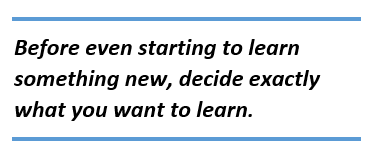

A google search for how to take a class results in over 1.5 billion results. That's a lot of advice, and to be fair, some is very specific, including how to take online high school classes. After my recent post about techniques for getting more from online courses, I found that some readers wanted to learn more about how to get more from classes in general. I can't complete with the material found in 1.5 billion search results, of course, but I will share some advice I've gathered after teaching classes for almost forty years. All the advice from the earlier post applies, of course, and this additional advice applies to any learning environment from live to online to elearning to book learning.
- Before even starting to learn something new, decide exactly what you want to learn. Whenever I teach a class, I ask participants to share why they are attending, that is, what they want to learn. All too often I've heard, "I am here because my boss told me to go." When I hear that I try to get that participant to contemplate why their boss sent them and what they really expect to learn. I generally get at least some idea of why they are really there.Deciding what you want to learn preps your brain to accept the material you are seeking.
- Take opportunities to practice while you are learning. This could be anything from a group activity to writing software to giving presentations. If you are taking a class with an instructor or have access to a coach or mentor, so much the better: he or she can evaluate your practice and provide feedback to help you learn even more.As an undergraduate computer engineering student, I discovered the programming language C and wanted to learn it. I was programming in a handful of other languages already, but C looked interesting. There was only one book on programming in C, and our school bookstore had two copies. My best friend and I each bought one. After reading the book and working out all the activities at the ends of the chapters, we designed a project to test our skills. I later taught that university's first course in C because I knew it so well.
- Persist. Don't stop learning! Spaced Repetition is a brain-based technique to improve retention. It is a formal expression of the old adage "practice makes perfect." The idea is that repeated exposure to material - over time periods of increasing length - aids significantly in retention.While not all learning involves spaced repetition, you can reap many of the benefits by revisiting the material repeatedly after first being exposed to it. When I first started teaching courses for adults, there was little follow-on of any kind. Today follow-on opportunities are common.Learning Tree provides its Computing Sandbox to allow participants to practice hands-on computer exercises after a course is over, After-Course Instructor Coaching to help participants apply what they have learned, and multiple blended learning opportunities, depending on course topic.
Plan, practice, persist: these three steps will go a long way toward improving your learning retention.


